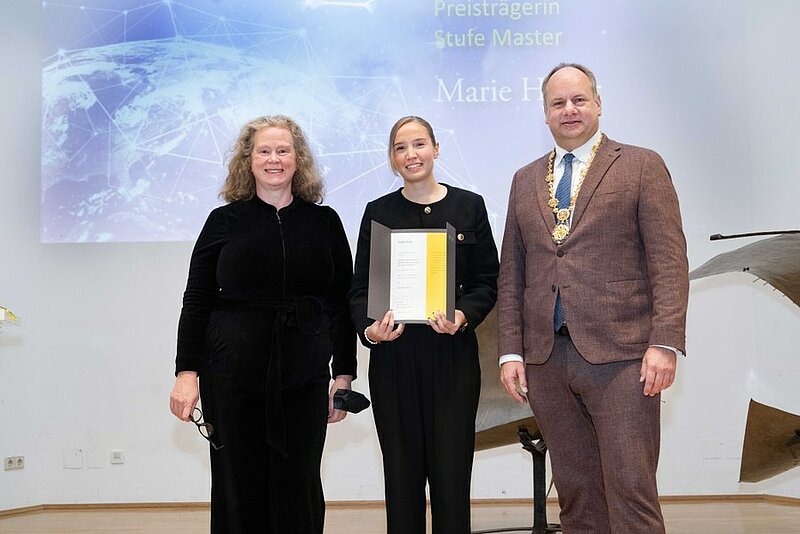On Saturday, April 27, the City of Dresden once again honored outstanding scientific achievements with the prestigious DRESDEN EXCELLENCE AWARD. The annual prize is awarded for exceptional scientific work originating in Dresden. Marie Hoyer, a graduate of the Molecular Bioengineering Master’s program at the Center for Molecular and Cellular Bioengineering (CMCB), received the prize for an outstanding Master’s thesis. As part of her Master’s studies at the CMCB, Marie Hoyer focused on spinal cord regeneration in zebrafish under the guidance of Prof. Catherina Becker at the Center for Regenerative Therapies Dresden (CRTD) and Prof. Otger Campàs at the Physics of Life Excellence Cluster (PoL).
In contrast to humans, zebrafish can completely heal an injured spinal cord. The Becker group at the CRTD studies this process to understand the molecular basis for these spectacular abilities. Marie’s project was an interdisciplinary collaboration between the Becker and Campàs groups, combining molecular biology with biophysics. “Most of the research traditionally focuses on studying various molecules and chemicals, but recent studies show that regenerating cells might also sense physical forces such as pressure and stretch. Therefore, my Master’s thesis focused on finding ways to measure these forces to understand their impact on the regeneration process,” explains Marie.
To measure the forces inside the regenerating tissue, Marie needed a proxy that could be easily imaged with a microscope and analyzed. She used tiny drops of oil that deformed proportionally to the force applied to the tissue. Based on the level of oil deformation, Marie was able to calculate the amount of force that had been applied to the cell. “Regeneration and regenerative biology have always intrigued me. I was fascinated by axolotl and zebrafish – the animals that can regenerate so many tissues. However, it wasn’t until 2018, when my best friend suffered a spinal cord injury, that I started to seriously think about working in science and medicine. Since then, It’s been my biggest goal to understand the molecular background behind spinal cord injuries and help develop a therapy for people affected by it. The Becker group was a perfect fit for me,” says Marie.
“It was a pleasure working with Marie. She experienced a lot of setbacks during her work and had to not only work hard but also be really creative to complete the project. Her dedication kept her going forward and resulted in a wonderful set of results that our lab will now build upon,” says Prof. Catherina Becker, research group leader at the CRTD and Marie’s thesis co-supervisor. "I am impressed with Marie. She had to learn techniques from physics and use them in a complex biological problem. She did an outstanding job and even took the research into new interesting directions that we did not expect,” says Prof. Otger Campàs, research group leader at PoL and Marie’s thesis co-supervisor.
About the DRESDEN EXCELLENCE AWARD
Every year the City of Dresden, together with the network “Dresden – City of Science”, recognizes the outstanding scientific work from Dresden with the DRESDEN EXCELLENCE AWARD. The award is presented to four scientists across the academic levels of Bachelor’s, Master’s, PhD, and habilitation. This year, three out of four award winners were from TU Dresden. You can find more information about the winners in the City of Dresden press release and on the TU Dresden website.
